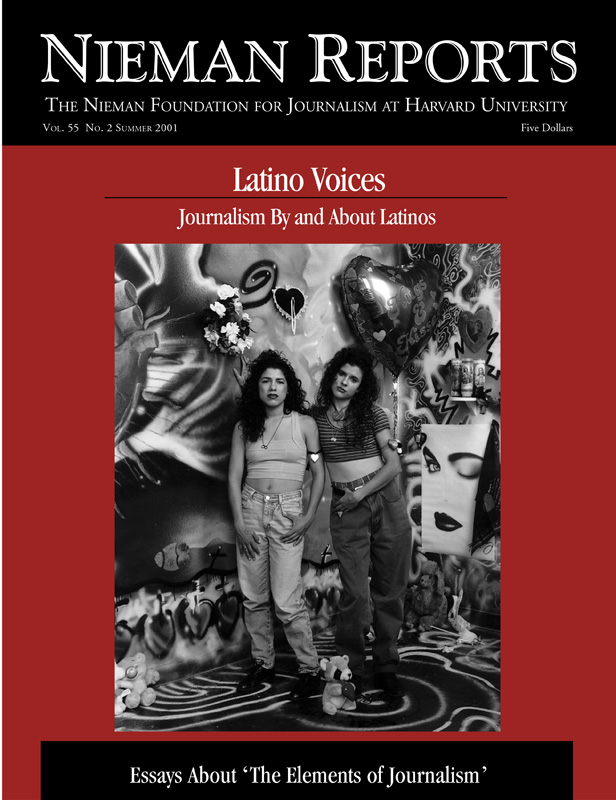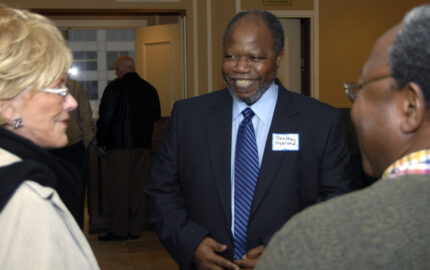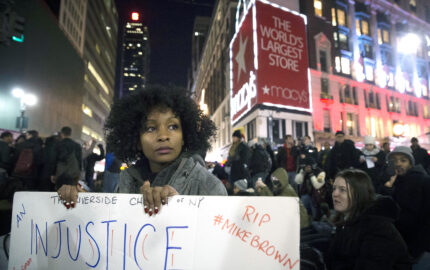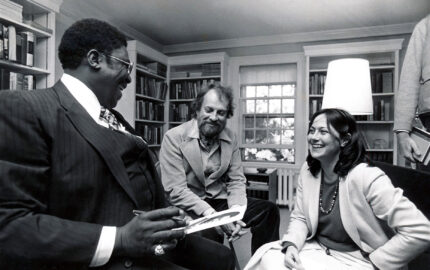Digital technology has journalists and others talking about its impact on the future of news reporting. Some envision a day, not too far away, when the various media will merge their news gathering efforts. A reporter will dig for information, shoot images, record ambient sound, write and deliver the text. No need for producers or camera and sound people when a reporter can do it all. These digital images, words and sounds then can be readapted to fit the varying needs of the Internet, radio, TV and print. This is called convergence.
Many see this approach as advancing—for the better—how journalism is practiced. After a few weeks of introduction to its possibilities, count me among the skeptics.
In April, six Nieman Fellows embarked on a crash course in digital video, a new offering at Lippmann House. Our instructor was documentary filmmaker Bryan Rich, a 1998 Nieman, whose most recent project is a film about ethnic cleansing in Burundi. For the first series of classes, 18 Niemans vied for six coveted spots. Four women and two men from five countries, evenly divided between print and broadcast, were chosen by lottery. Others would have a chance to participate before our year ended. We were enthused and curious about the new technology, but also harbored mid-career fears about being left behind in this digital revolution.
Most of us caught on quickly to the basic shooting techniques, but it was hard to see how to focus on reporting while fumbling with equipment. With practice, though, the camera felt more comfortable in my hand. On a visit to the John F. Kennedy Library in Boston, I panned across a wall of historic photos. As I did, I realized that the images being captured were telling a story that a thousand words might not. As pictures rushed past my eye, I imagined hearing JFK’s distinctively Boston voice, answered by thunderous applause, giving way to narration.
One evening, when Lippmann House was quiet, I sat at the editing keyboard, moving clips around, using the mouse to drag them from a storage bin into the timeline. I hit the “b” key to activate the razor blade to cut unsteady images and unwanted sound. I highlighted frames to be discarded and hit “delete.” The trim was done. Then, I called up a list of special effects and, one by one, dragged their icons into the timeline, dropping them onto the seams between clips. Images dissolved, swirled and spun into one another.
Shaping the video segment was fun, but deceptively easy. What looked steady to my eye shook when I replayed it. Getting the light just right proved problematic. And the editing program, while user-friendly, was complicated. The instruction book, though written for non-technical folks, was hard to follow.
Consider what our group accomplished in a month, and those who want to reserve a place for old media might feel comforted. Yes, we now know how to load and operate a digital camera. And we produced clips of Nieman children playing at Lippmann House, Nieman Fellows reflecting on the year’s events, and student protesters pushing for living wages for Harvard workers. At the editing table, we learned how to log and capture clips, how to put pieces together and how to tear them apart. Though some in our group produced short features, no one managed to make the tidy two-minute story Bryan envisioned we would when the course began. Even so, he was pleased with what he saw, because at least it was a start.
Mastering the technology is one thing. Reinventing ourselves as a one-person production crew is another. Has our vision been enlarged? Unquestionably, yes. For those already familiar with radio and TV reporting, possibilities appear more real. Andrew Sussman (radio) believes digital video is a way to combine the best of traditional media in a single medium. Lourdes Cárdenas (TV and print) regards it as a good tool to report breaking news stories from the field. But Consuelo Saavedra (TV) doesn’t think she alone could replace the production team she relies on and she worries that the unique nature of various media will be lost as they merge.
Former Curator Bill Kovach reminded our Nieman class recently that the most important skills for journalists in the future will be reporting, gathering information and verifying it—just as always. “Technology is nothing but a transmission machine,” he said. Still, he urged us to learn how to use this new technology.
Now I’ve done that, and I’m glad to have had the chance. However, as I get ready to head back to The Des Moines Register, I intend to keep my day job. As promising as this technology might seem, we’re still a long way from being replaced.
Anne Fitzgerald, a 2001 Nieman, is agribusiness writer for the Des Moines Register.
Many see this approach as advancing—for the better—how journalism is practiced. After a few weeks of introduction to its possibilities, count me among the skeptics.
In April, six Nieman Fellows embarked on a crash course in digital video, a new offering at Lippmann House. Our instructor was documentary filmmaker Bryan Rich, a 1998 Nieman, whose most recent project is a film about ethnic cleansing in Burundi. For the first series of classes, 18 Niemans vied for six coveted spots. Four women and two men from five countries, evenly divided between print and broadcast, were chosen by lottery. Others would have a chance to participate before our year ended. We were enthused and curious about the new technology, but also harbored mid-career fears about being left behind in this digital revolution.
Most of us caught on quickly to the basic shooting techniques, but it was hard to see how to focus on reporting while fumbling with equipment. With practice, though, the camera felt more comfortable in my hand. On a visit to the John F. Kennedy Library in Boston, I panned across a wall of historic photos. As I did, I realized that the images being captured were telling a story that a thousand words might not. As pictures rushed past my eye, I imagined hearing JFK’s distinctively Boston voice, answered by thunderous applause, giving way to narration.
One evening, when Lippmann House was quiet, I sat at the editing keyboard, moving clips around, using the mouse to drag them from a storage bin into the timeline. I hit the “b” key to activate the razor blade to cut unsteady images and unwanted sound. I highlighted frames to be discarded and hit “delete.” The trim was done. Then, I called up a list of special effects and, one by one, dragged their icons into the timeline, dropping them onto the seams between clips. Images dissolved, swirled and spun into one another.
Shaping the video segment was fun, but deceptively easy. What looked steady to my eye shook when I replayed it. Getting the light just right proved problematic. And the editing program, while user-friendly, was complicated. The instruction book, though written for non-technical folks, was hard to follow.
Consider what our group accomplished in a month, and those who want to reserve a place for old media might feel comforted. Yes, we now know how to load and operate a digital camera. And we produced clips of Nieman children playing at Lippmann House, Nieman Fellows reflecting on the year’s events, and student protesters pushing for living wages for Harvard workers. At the editing table, we learned how to log and capture clips, how to put pieces together and how to tear them apart. Though some in our group produced short features, no one managed to make the tidy two-minute story Bryan envisioned we would when the course began. Even so, he was pleased with what he saw, because at least it was a start.
Mastering the technology is one thing. Reinventing ourselves as a one-person production crew is another. Has our vision been enlarged? Unquestionably, yes. For those already familiar with radio and TV reporting, possibilities appear more real. Andrew Sussman (radio) believes digital video is a way to combine the best of traditional media in a single medium. Lourdes Cárdenas (TV and print) regards it as a good tool to report breaking news stories from the field. But Consuelo Saavedra (TV) doesn’t think she alone could replace the production team she relies on and she worries that the unique nature of various media will be lost as they merge.
Former Curator Bill Kovach reminded our Nieman class recently that the most important skills for journalists in the future will be reporting, gathering information and verifying it—just as always. “Technology is nothing but a transmission machine,” he said. Still, he urged us to learn how to use this new technology.
Now I’ve done that, and I’m glad to have had the chance. However, as I get ready to head back to The Des Moines Register, I intend to keep my day job. As promising as this technology might seem, we’re still a long way from being replaced.
Anne Fitzgerald, a 2001 Nieman, is agribusiness writer for the Des Moines Register.



